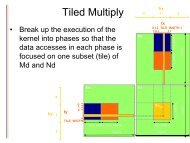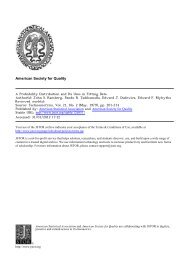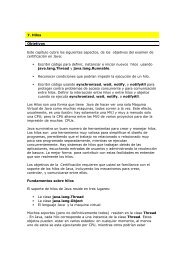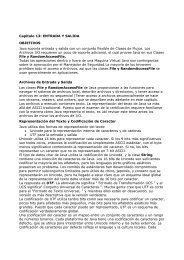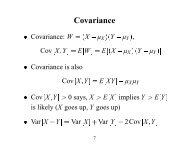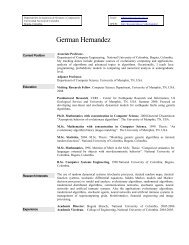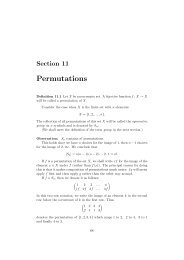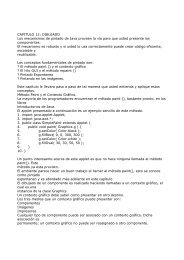- 124 -def ESURNAME E = SURNAME (NAME E)def ADDRESS E = HEAD (TAIL E)def PHONE E = HEAD (TAIL (TAIL E))These selec<strong>to</strong>r functions disguises the underlying representation and makes it easier <strong>to</strong> understand the functions thatuse them.For example, given a circulation list we might want <strong>to</strong> delete a name, knowing the surname. If the list is empty thenreturn the empty list. If the list is not empty then if the surname is that of the first name then return the rest of the list.Otherwise, add the first name <strong>to</strong> the result of deleting the required name from the rest of the list:rec NDELETE S [] = []or NDELETE S (H::T) =IF STRING_EQUAL S (SURNAME H)THEN TELSE H::(NDELETE S T)For example:NDELETE "Charlie" [["<strong>An</strong>na","Able"],["Betty","Baker"],["Clarice","Charlie"]] -> ... ->["<strong>An</strong>na","Able"]::(NDELETE "Charlie" [["Betty","Baker"],["Clarice","Charlie"]]) -> ... ->["<strong>An</strong>na","Able"]::["Betty","Baker"]::(NDELETE "Charlie" [["Clarice","Charlie"]]) -> ... ->["<strong>An</strong>na","Able"]::["Betty","Baker"]::[] ==[["<strong>An</strong>na","Able"],["Betty","Baker"]]For example, given a s<strong>to</strong>ck control list, we might want <strong>to</strong> increment the s<strong>to</strong>ck level, knowing the item name. If the listis empty then return the empty list. If the list is not empty then if the first item is the required one then increment itss<strong>to</strong>ck level and add the changed item <strong>to</strong> the rest of the list. Otherwise, add the first item <strong>to</strong> the result of searching therest of the list:rec SINCREMENT I V [] = []or SINCREMENT I V (H::T) =IF STRING_EQUAL I (ITEM H)THEN [(ITEM H),(STOCK H)+V,(REORDER H)]::TELSE H::(SINCREMENT I V T)For example:SINCREMENT "modem" 10 [["VDU",25,12],["modem",10,12],["printer",125,10]] -> ... ->["VDU",25,12]::(SINCREMENT "modem" 10 [["modem",10,12],
- 125 -["VDU",25,12]::["modem",20,12]::[["printer",125,10]] ==[["VDU",25,12],["modem",20,12]["printer",125,10]]["printer",125,10]]) -> ... ->For example, given a telephone direc<strong>to</strong>ry, we might want <strong>to</strong> add a new entry in alphabetic surname order. If thedirec<strong>to</strong>ry is empty then make a new direc<strong>to</strong>ry from the new entry. If the direc<strong>to</strong>ry is not empty then if the new entrycomes before the first entry then add it <strong>to</strong> the front of the direc<strong>to</strong>ry. Otherwise, add the first entry <strong>to</strong> the result ofadding the new entry <strong>to</strong> the rest of the direc<strong>to</strong>ry:rec DINSERT E [] = [E]or DINSERT E (H::T) =IF STRING_LESS (ESURNAME E) (ESURNAME H)THEN E::H::TELSE H::(DINSERT E T)For example:DINSERT[["Chris","Catnip"],"Credit",3333][[["<strong>An</strong>na","Able"],"Accounts",1212],[["Betty","Baker"],"Boiler room",4242],[["Clarice","Charlie"],"Cus<strong>to</strong>mer orders",2424]] -> ... ->[["<strong>An</strong>na","Able"],"Accounts",1212]::(DINSERT[["Chris","Catnip"],"Credit",3333][[["Betty","Baker"],"Boiler room",4242],[["Clarice","Charlie"],"Cus<strong>to</strong>mer orders",2424]]) -> ... ->[["<strong>An</strong>na","Able"],"Accounts",1212]::[["Betty","Baker"],"Boiler room",4242]::(DINSERT[["Chris","Catnip"],"Credit",3333][[["Clarice","Charlie"],"Cus<strong>to</strong>mer orders",2424]]) -> ... ->[["<strong>An</strong>na","Able"],"Accounts",1212]::[["Betty","Baker"],"Boiler room",4242]::[["Chris","Catnip"],"Credit",3333]::[[["Clarice","Charlie"],"Cus<strong>to</strong>mer orders",2424]] ==[[["<strong>An</strong>na","Able"],"Accounts",1212],[["Betty","Baker"],"Boiler room",4242],[["Chris","Catnip"],"Credit",3333],[["Clarice","Charlie"],"Cus<strong>to</strong>mer orders",2424]]7.5. Generalised structure matchingIn chapter 6 we introduced structure matching in<strong>to</strong> function definitions. Objects are defined in terms of constant basecases and structured recursion cases. Thus, function definitions have base cases with constants instead of boundvariables for matching against constant arguments, and recursion cases with structured bound variable for matchingagainst structured arguments. In particular, for list processing we have used bound variable lists of the form:
- Page 1 and 2:
AN INTRODUCTION TO FUNCTIONAL PROGR
- Page 3 and 4:
- 3 -LISP was one of the earliest l
- Page 5 and 6:
- 5 -1.4. Execution order in impera
- Page 7 and 8:
- 7 -B[1] + B[2] + ... + B[M] + SUM
- Page 9 and 10:
- 9 -quantifiers to describe proper
- Page 11 and 12:
- 11 -program specification all use
- Page 13 and 14:
- 13 -To begin with, we will briefl
- Page 15 and 16:
- 15 -Now, compare this with the fo
- Page 17 and 18:
- 17 -wherefor example: ::= λx.x
- Page 19 and 20:
- 19 -giving:λx.xAn identity opera
- Page 21 and 22:
- 21 -λx.xThis is now evaluated as
- Page 23 and 24:
- 23 -in the body:λarg.(func arg)g
- Page 25 and 26:
- 25 -We can use the self applicati
- Page 27 and 28:
- 27 -and body:λsecond.firstWhen a
- Page 29 and 30:
- 29 -2.12.3. Making pairs from two
- Page 31 and 32:
- 31 -(λx.x λx.x) =>λx.xIt is po
- Page 33 and 34:
- 33 -i) the expression is an appli
- Page 35 and 36:
- 35 -((λfunc.λarg.(func arg) arg
- Page 37 and 38:
- 37 -Bound variablesi) is bound i
- Page 39 and 40:
- 39 -i) λx.λy.(λx.y λy.x)ii)
- Page 41 and 42:
- 41 -(((cond false) true) x) ==(((
- Page 43 and 44:
- 43 -3.5. OROR is a binary operato
- Page 45 and 46:
- 45 -two ==(succ one) ==(λn.λs.(
- Page 47 and 48:
- 47 -So:def pred = λn.(((cond zer
- Page 49 and 50:
- 49 -For example, we could re-writ
- Page 51 and 52:
- 51 -4) Show that:λx.(succ (pred
- Page 53 and 54:
- 53 -gobble a sweet andgobble a sw
- Page 55 and 56:
- 55 -then xelse f (succ x) (pred y
- Page 57 and 58:
- 57 -and:-> ... ->will still imply
- Page 59 and 60:
- 59 -If this function is now appli
- Page 61 and 62:
- 61 -def add1 f x y =if iszero yth
- Page 63 and 64:
- 63 -the second minus the first wi
- Page 65 and 66:
- 65 -succ (succ (div1 one four)) -
- Page 67 and 68:
- 67 -n * n-1 * n-2 * ... * 1in nor
- Page 69 and 70:
- 69 -within our intended interpret
- Page 71 and 72:
- 71 -Sometimes it may be necessary
- Page 73 and 74: - 73 -λvalue.λs.(s error_type val
- Page 75 and 76: - 75 -def AND X Y =if and (isbool X
- Page 77 and 78: - 77 -def ISBOOL B = MAKE_BOOL (isb
- Page 79 and 80: - 79 -Note that we return NUMB_ERRO
- Page 81 and 82: - 81 -def ’1’ = MAKE_CHAR (succ
- Page 83 and 84: - 83 -will do so. However, for a no
- Page 85 and 86: - 85 -To simplify the presentation
- Page 87 and 88: - 87 -rec 0 = or (SUCC ) = Thus,
- Page 89 and 90: - 89 -def signed_type = ...def SIGN
- Page 91 and 92: - 91 -If the head of a list and the
- Page 93 and 94: - 93 -def MAKE_LIST = make_obj list
- Page 95 and 96: - 95 -LIST_ERRORThe test for an emp
- Page 97 and 98: - 97 -CONS 1 (APPEND (TAIL (CONS 1
- Page 99 and 100: - 99 -For example:1::(2::(3::(4::[]
- Page 101 and 102: - 101 -LIST_EQUAL [] [] = TRUELIST_
- Page 103 and 104: - 103 -In general, the string:" "is
- Page 105 and 106: - 105 -(STRING_LESS (’r’::"ridg
- Page 107 and 108: - 107 -gives value of "" with 10*(1
- Page 109 and 110: - 109 -In general, for:rec =IF IS
- Page 111 and 112: - 111 -Note that this description t
- Page 113 and 114: - 113 -Similarly, to remove a speci
- Page 115 and 116: - 115 -rec DOUBLE [] = []or DOUBLE
- Page 117 and 118: - 117 -"cats"::"dogs"::(λW.(APPEND
- Page 119 and 120: - 119 -‘TAIL ’>6.18. Exercises1
- Page 121 and 122: - 121 -["Betty","Baker"].For exampl
- Page 123: - 123 -For example:IF STRING_EQUAL
- Page 127 and 128: - 127 -matches the argument:so:[,,]
- Page 129 and 130: - 129 -For example, suppose we have
- Page 131 and 132: - 131 -to place the Nth item, skip
- Page 133 and 134: - 133 -[7,EMPTY,EMPTY]To add 4 to t
- Page 135 and 136: - 135 -[3,EMPTY,EMPTY],[5,EMPTY,[6,
- Page 137 and 138: - 137 -TFIND 5 [4,[3,EMPTY,EMPTY],[
- Page 139 and 140: - 139 -7.14. Binary tree efficiency
- Page 141 and 142: - 141 -λ[a,b].(SUM_SQ2 a b)so:def
- Page 143 and 144: - 143 -and so on.def istype (t::o)=
- Page 145 and 146: - 145 - ::= ( + ) |( + ) |( + ) |(
- Page 147 and 148: - 147 -IF ISZERO (ADD 1 2)THEN 1ELS
- Page 149 and 150: - 149 -cond one (add (succ one) (pr
- Page 151 and 152: - 151 -λdummy.e2Instead, we have t
- Page 153 and 154: - 153 -The first Church-Rosser theo
- Page 155 and 156: - 155 -(λx.x λy.y) 2=>λy.yand th
- Page 157 and 158: - 157 -For example, consider:SQUARE
- Page 159 and 160: - 159 -SQUARE 1 => ... =>IFIND 1 SQ
- Page 161 and 162: - 161 - : For objects which do not
- Page 163 and 164: - 163 -is a tuple consisting of two
- Page 165 and 166: - 165 -to indicate both integer and
- Page 167 and 168: - 167 -- tl;> fn : (’a list) -> (
- Page 169 and 170: - 169 -Functions have the form:fn
- Page 171 and 172: - 171 -For example, to find the lar
- Page 173 and 174: - 173 -9.19. Pattern matchingSML fu
- Page 175 and 176:
- 175 -end;> val sort = fn : (int l
- Page 177 and 178:
- 177 -- fun length [] = 0 |length
- Page 179 and 180:
- 179 -- datatype traffic_light = r
- Page 181 and 182:
- 181 -but this defines the new typ
- Page 183 and 184:
- 183 -con empty = empty : (’a tr
- Page 185 and 186:
- 185 -iv)Join strings s1 and s2 to
- Page 187 and 188:
- 187 -( + )( - )( * )( / ) == numb
- Page 189 and 190:
- 189 -10.4. Logictis the primitive
- Page 191 and 192:
- 191 -(> 9 8 7 6 5) ->tThe primiti
- Page 193 and 194:
- 193 -It is important to note that
- Page 195 and 196:
- 195 -nilwhich may be also written
- Page 197 and 198:
- 197 -(car ’(1 2 3)) ->1(cdr ’
- Page 199 and 200:
- 199 -(tadd 7 nil) ->(7 nil nil)(t
- Page 201 and 202:
- 201 -For example, suppose the ave
- Page 203 and 204:
- 203 -10.17. Symbols, quoting and
- Page 205 and 206:
- 205 -Note once again that there m
- Page 207 and 208:
- 207 -iv) find the sum of applying
- Page 209 and 210:
- 209 -ii) Write a function which i
- Page 211 and 212:
- 211 -Chapter 3 - Conditions, bool
- Page 213 and 214:
- 213 -11. R. M. Burstall, J. S. Co
- Page 215 and 216:
- 215 -55. P. Wegner, Programming L
- Page 217 and 218:
- 217 - - (g h) - - g - - h - f
- Page 219 and 220:
- 219 -λb.b3)i) a) (identity ) =>
- Page 221 and 222:
- 221 -λb.(λa.{a} b))λa.{a}a fre
- Page 223 and 224:
- 223 -not (or false false) => ...
- Page 225 and 226:
- 225 -false (implies false true) f
- Page 227 and 228:
- 227 -then fun nelse add (fun n) (
- Page 229 and 230:
- 229 -i) ISBOOL 3 => ... =>MAKE_BO
- Page 231 and 232:
- 231 -iii)def SIGN_+ X Y =if and (
- Page 233 and 234:
- 233 -THEN [H,M,S]ELSElet M = M +
- Page 235 and 236:
- 235 -λy.y5 reductionsλf.λa.(f
- Page 237 and 238:
- 237 -gconstr (v:int) ((h::t):int
- Page 239 and 240:
- 239 -0(+ n (nsum (- n 1)))))ii) (
- Page 241:
- 241 -(if (= m1 m2)(if (< s1 s2)tn



